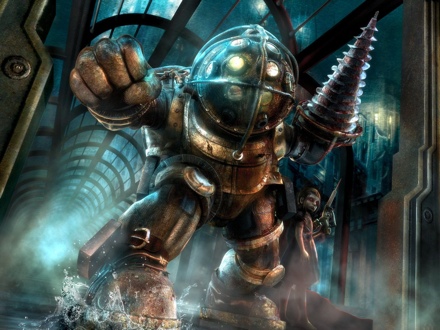 There are lots of celebrities whom I would like to have sex with. Lady Gaga is not one of them.
There are lots of celebrities whom I would like to have sex with. Lady Gaga is not one of them.
“Joe, you red-blooded bucket of unabated virility and leonine manliness! Why on earth not? Aren’t you utterly entranced by the current Empress of Popular Music?”
Well, Hypothetical Reader, yes. Yes I am. I find Her Gaga-ness as fascinating and entertaining as any other consumer of popular culture. However, unlike so many other nubile young famous people, I don’t really want to fuck her. When you really think about it, that’s kind of neat.
And also, really, really fucking weird.
I mean it! Really weird. Utterly strange. Most of celebrity, fame, and general media-ness has to do with the parading about of pretty young things, both male and female, whom the general populace can fantasize about whilst touching themselves at night. If you disagree with me, then I would like to politely refer you to to Jersey Shore, a massively popular television show that seems to be mostly about breasts and hair of titanic proportions, and men who possess no shortage of hair gel but not a single shirt.
I suppose what I’m trying to say, is that if you don’t think that popular culture is about fantasy sex, then you are a delusional stupid person who has a bowl of sodden guacamole instead of a brain.
So, yeah. Anyway, here’s how it usually works in the music world: You’ve got your standard rock-star person up there on stage. Let’s say it’s David Bowie, someone who’s also known for being sort of weird and shiny. There are lots of women in the audience. These women are watching and enjoying the music, but also, on a certain level, they probably want to fuck the Thin White Duke. Sure, it might be in just a little corner of their mind, but they think to themselves “I would totally do his glitter-covered ass.” Many of them would settle for having their male consorts be a bit more Bowie-like, and proceed to pursue men who wear impossibly tight pants.
You’ve also got men in the audience, men filled with a sense of identification who want to be David Bowie. They don’t want to fuck him, but they want to be him while he’s fucking someone else. They put themselves in his role, and they get off on it. This is why James Bond is popular.
Meanwhile, you’ve also got gay and bisexual dudes who want to be and fuck David Bowie simultaneously, and they are probably having the best time of all, eventually breaking out into a cocaine-fueled dude orgy that fills the other people in the concert with a mixture of arousal, envy, and fear.
Where were we? Oh yes. Sexy fame. That’s how it usually works.
Lady Gaga does not seem to do this.
“Joe, you massively erudite cogitator! How could you say that? Didn’t you notice how she often dresses in a provocative manner?”
Yes, Hypothetical Reader. Yes I did.
Lady Gaga objectifies herself. I do not mean that she objectifies herself in the sense that the word is normally used, but rather she portrays herself as an object, specifically something manufactured. In her videos she’s often made to look artificial or damaged in some way, covered in armor, plastic, bandages, or exotic clothing. She does bare a lot of skin, yes, but she comes off more like something that has been engineered to be a simulacrum of sexuality. There is a sort of perfunctory and robotic way of her movements, or rather, how her videos are shot and edited to portray her movements. She and her backup dancers move like they are filled with pnuematic cams and shafts, and there is a an unnatural, puppet-like lurching to her.
She does not flirt with the camera. There is very little in the way of knowing winks or direct interaction with the audience. Instead we are given a kabuki-like tableau of massively elaborate costumes and enigmatic visuals. Faked sex in popular entertainment is often pitiable, and Gaga, rather mercifully, does not attempt it. Instead, she revels in her bizarre nature persona.
I like this. After seeing lots of interchangeable starlets look directly into the camera and act like they are singing just for you, Gaga’s detached and cold videos are immensely refreshing. She does not attempt to be authentic when she is not. She does not pretend she is not artificial when she is. She is completely honest about how fake she is which kind of makes her like Andy Warhol, except that she’s entertaining.
It also makes her more honest than, well, most other pop stars. Lady Gaga proudly proclaims that she is a product of an advanced industrial society, a singing, dancing super-robot. And she is a glorious super-robot, a fantastically well-engineered one.
Which brings me back to my original point: I don’t want to fuck a robot. Sure, I used to live in Japan, but I never really got into that scene.
I respect a well-engineered and transparently fake thing. I like machines, spectacle, and moving shiny things. Moving shiny things like Lady Gaga. Her whole schtick is well-executed artificiality, and that beats fake authenticity any day. It also acts as a refreshing counter the cloying and ultimately pitiable attempts at sexiness that are so often trotted out for our collective “entertainment.”
So, no. Gaga the android, the plastic-and-brass dance robot, the techno-puppet, does not arouse. She does something better- she entertains.
I like numbered streets. They are a force of good in the world. If, for example, you are looking for 32nd Ave, you would do well to look between 31st and 33rd. Easy, intuitive, and logical. Numbered streets are wonderful. Only slightly less awesome are streets that are in alphabetical order.



